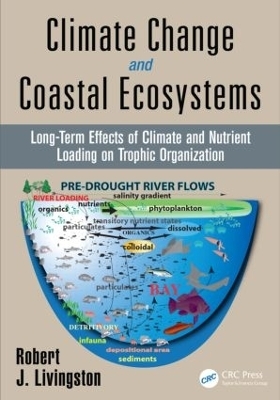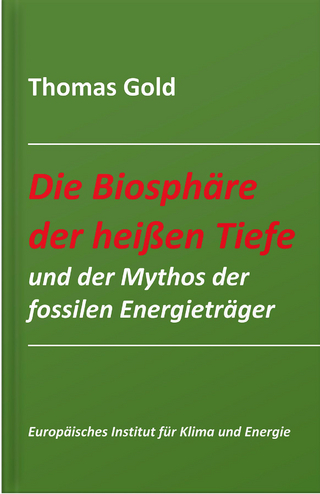
Climate Change and Coastal Ecosystems
Crc Press Inc (Verlag)
978-1-4665-6842-6 (ISBN)
A narrative account of how estuaries around the world are being altered by human forces and human-induced global climate changes, Climate Change and Coastal Ecosystems: Long-Term Effects of Climate and Nutrient Loading on Trophic Organization chronicles a more than 40-year-old research effort conducted by Dr. Robert J. Livingston and his research team at Florida State University. Designed to evaluate system-level responses to natural and anthropogenic nutrient loading and long-term climate changes, the study focused on the northeast Gulf of Mexico river–bay systems, and concentrated on phytoplankton/benthic macrophyte productivity and associated food web organization. It addressed the changes of food web structure relative to long-term trends of climatological conditions, and was carried out using a combination of field-descriptive and experimental approaches.
Details Climate Change, Climate Change Effects, and Eutrophication
This book includes comparative analyses of how the trophic organization of different river–bay ecosystems responded to variations of both anthropogenic impacts and natural driving factors in space and time. It incorporates a climate database and evaluates the effects of climate change in the region. It also provides insights into the effects of nutrient loading and climate on the trophic organization of coastal systems in other global regions.
Presents research compiled from consistent field sampling methods and detailed taxonomic identifications over an extended period of study
Includes the methods and materials that the research team used to access the health and trophic organization of Florida’s estuaries
Provides an up-to-date bibliography of estuarine publications and reports
Based on a longitudinal study of anthropogenic and natural driving factors on river-estuarine systems in the northeast Gulf of Mexico, Climate Change and Coastal Ecosystems: Long-Term Effects of Climate and Nutrient Loading on Trophic Organization is useful as a reference for researchers working on riverine, estuarine, and coastal marine systems.
Robert J. Livingston is currently professor emeritus in the Department of Biological Science at Florida State University (Tallahassee, Florida). His interests include aquatic ecology, pollution biology, field and laboratory experimentation, and long-term ecosystem-level research on freshwater, estuarine, and marine systems. Over the past 43 years, Livingston’s research group has conducted a series of studies in areas from Maine to Mississippi. Dr. Livingston is the author of over 170 scientific papers and has written or edited eight books on the subject of aquatic ecology. He has been the principal investigator for more than 100 projects since 1970.
Part I. Overview. Introduction. Methods. Part II. Long-Term Habit Conditions. Regional Background. Rainfall and River Flows: Long-Term Changes. Nutrient Loading: Natural versus Anthropogenic Inputs. Dredged Passes to the Gulf: Comparative Effects. Methods. Part III. Trophic Response to Long-Term Climate Changes. Climatological Impacts on Gulf Estuaries. Part IV. Impacts of Anthropogenic Nutrient Loading. Estuarine Response to Urban Nutrient Loading. Part V. Comparative Analysis of Gulf Ecosystems. Trophic Organization. Part VI. Information Dissemination. Omission and Misrepresentation by Regional News Media. Part VII. Closing. Conclusion. Appendices. Index.
| Erscheint lt. Verlag | 7.11.2014 |
|---|---|
| Reihe/Serie | CRC Marine Science |
| Zusatzinfo | 27 Tables, black and white; 11 Illustrations, color; 191 Illustrations, black and white |
| Verlagsort | Bosa Roca |
| Sprache | englisch |
| Maße | 178 x 254 mm |
| Gewicht | 1202 g |
| Themenwelt | Naturwissenschaften ► Biologie ► Biochemie |
| Naturwissenschaften ► Biologie ► Limnologie / Meeresbiologie | |
| Naturwissenschaften ► Biologie ► Ökologie / Naturschutz | |
| Naturwissenschaften ► Geowissenschaften ► Geologie | |
| Technik ► Umwelttechnik / Biotechnologie | |
| Weitere Fachgebiete ► Land- / Forstwirtschaft / Fischerei | |
| ISBN-10 | 1-4665-6842-9 / 1466568429 |
| ISBN-13 | 978-1-4665-6842-6 / 9781466568426 |
| Zustand | Neuware |
| Informationen gemäß Produktsicherheitsverordnung (GPSR) | |
| Haben Sie eine Frage zum Produkt? |
aus dem Bereich


